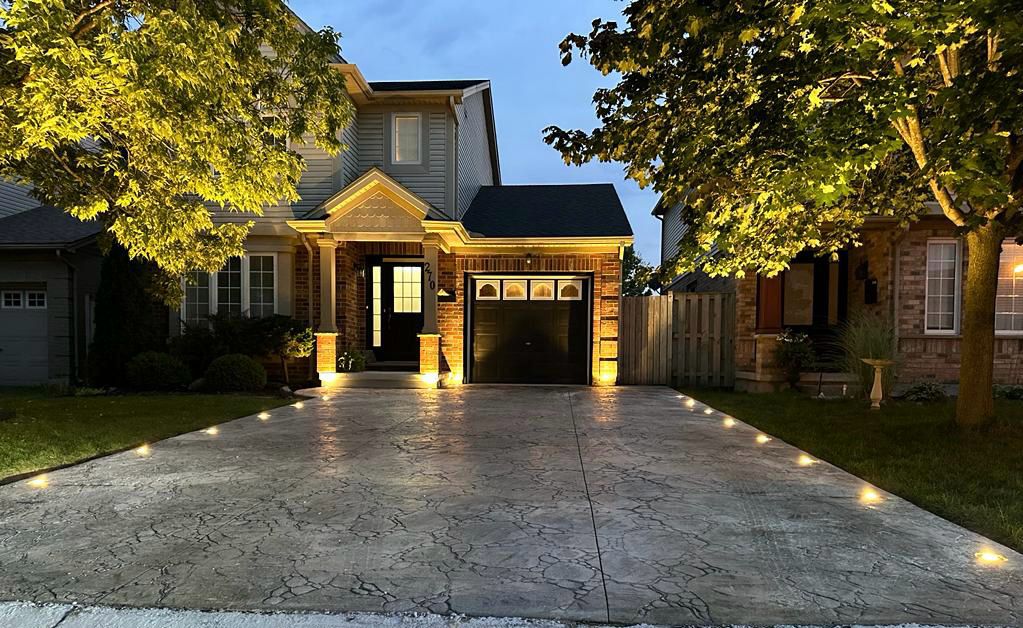Understanding Concrete Driveways: Pros, Cons, and Comparisons for Homeowners in London, Ontario
When looking for a new driveway for your home in London, Ontario, you have various options to consider, each with its own set of benefits and drawbacks. Concrete and asphalt are among the most popular materials. In this blog post, we’ll look at the potential drawbacks of concrete driveways, compare their cost to asphalt, analyze the required thickness for durability, identify typical issues, and investigate the cheapest driveway solutions available. Whether you want to install or repair a driveway, this information will help you make an informed choice.
What are the disadvantages of having a concrete driveway?
While concrete driveways are popular because of their durability and aesthetic adaptability, they have a few drawbacks:
- Initial Cost: Concrete driveways cost more to install than asphalt driveways. This increased initial cost may be a significant consideration for many homeowners.
Concrete may crack owing to weather conditions, faulty installation, or insufficient maintenance. These fissures can be unattractive and may necessitate professional repairs. - Stains: Because concrete is porous, stains from oil, grease, and other substances can penetrate and be difficult to remove.
- Winter Performance: In colder climates, such as London, Ontario, concrete is more vulnerable to freeze-thaw cycles and the application of de-icing salts than asphalt.
Is it cheaper to have a concrete driveway than an asphalt one?
Initially, installing a concrete driveway is more expensive than asphalt. Concrete might cost between 45 and 50 percent more than asphalt, depending on the region and current material pricing. However, concrete driveways typically have a longer lifespan and require less care, potentially making them more cost-effective in the long term.
Upfront costs: Asphalt driveways are less expensive to install than concrete ones.
Long-term expenses: Concrete driveways have lower maintenance costs and a longer lifespan, which can offset the higher initial cost.
For a driveway, how deep should the concrete be?
The thickness of a concrete driveway determines its durability and longevity. A conventional passenger vehicle requires a concrete driveway that is at least four inches thick. If the driveway can accommodate heavier vehicles, we recommend increasing the thickness to five or six inches to provide additional stability and prevent cracking.
For an ordinary home application, the standard thickness is 4 inches.
Heavy Duty: 5–6 inches for driveways that can handle heavy vehicles.
What’s the biggest problem with concrete?
The main issue with concrete is its inclination to break. Several reasons can cause cracking, including:
Ground movement refers to changes in the ground caused by freezing and thawing, as well as poor compaction before pouring concrete.
Heavy Loads: The vehicle’s weight can exceed the concrete’s capabilities.
Improper Curing: If concrete does not cure slowly and uniformly, stress spots might form, eventually leading to cracking.
Addressing these issues through good installation and regular maintenance can dramatically increase the lifespan of a concrete driveway.
What is the cheapest type of driveway?
Gravel is often the cheapest type of driveway. Gravel driveways are inexpensive to create and maintain, but they require regular topping and may be less durable than paved roads. They also provide less traction in winter and are prone to ruts and displacement.
Gravel driveways have a low initial cost, but they require more care.
Asphalt driveways are less expensive than concrete and require only moderate maintenance.
Concrete driveways have a higher initial cost but require less upkeep over time.
Choosing the best material for your driveway in London, ON, entails balancing initial expenditures with long-term value and maintenance. While concrete driveways provide a robust, long-lasting choice with aesthetic versatility, they are more expensive to install and may crack or stain. In comparison, while asphalt is less expensive initially, it requires more frequent upkeep.
If affordability is your major issue, gravel may be an appropriate option; however, it lacks the durability and low maintenance of a paved driveway. Your specific requirements, budget, and willingness to perform upkeep will ultimately determine the best option.



